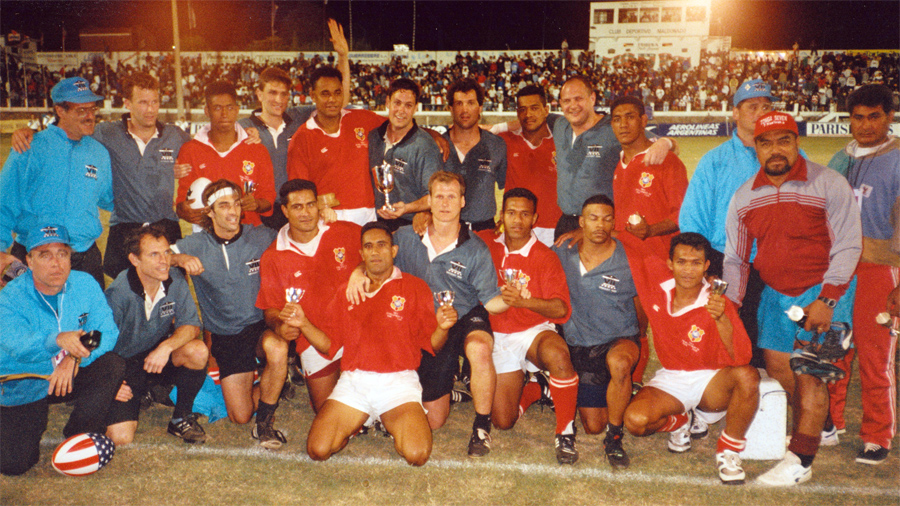January 7-8, 1995: Atlantis at Punta del Este
Sevens (Uruguay)
(Atlantis tournament #38)
Emil Signes
February 14, 1995
JUNE 15, 2013 (rev. July 24, 2013)
Argentina wins P�u�n�t�a�
�d�e�l� �E�s�t�e� �S�e�v�e�n�s�
B�e�s�t� �i�n� �t�h�e� �W�e�s�t� �a�n�d� �f�a�r�
�a�b�o�v�e� �a�v�e�r�a�g�e� �i�n� �t�h�e� �E�a�s�t�.�
Ever since the major rugby nations in the world began to come to
terms with sevens rugby by sending national teams to Hong Kong
(Fiji in 1976, Australia in 1977, New Zealand in 1983, Wales in
1990, Scotland and France in 1991, Ireland in 1993, and ��-
finally -�� England will go in
1995), other promoters have recognized the possibilities of
staging a major international sevens tournament either to
complement or even, after 1997, God forbid, replace Hong
Kong. So far more have failed than succeeded.
The Sydney Sevens lasted from 1986 to 1989 before it went under,
and the "new" Sydney Sevens is of the Rugby League variety.
The Sicily Sevens, inaugurated in 1990, may still be in existence,
but I'm sure it hasn't yet put more than 500 people into the
stands. Fiji continues to sponsor an international sevens,
but it is not clear what the future holds for it. Canberra,
Sri Lanka, Singapore, Bangkok, Benidorm, Lisbon, Dubai, the list
goes on, all have or are trying to, sponsor major international
sevens tournaments. Some prosper more than others; many
simply lead a year to year existence.
Even the Rugby World Cup in 1993, despite the exceptional quality
of play, failed to match Hong Kong as an event.
The country that may be succeeding best at the moment is one of
the only two countries in the world that lie entirely south of the
Tropic of Capricorn. If you guessed New Zealand, however,
you'd be wrong. It's Uruguay.
The Punta del Este Sevens began as a club sevens event in 1989,
sponsored by the British Schools Old Boys' Club, one of the
handful of first division clubs in Uruguay.
Rapidly, however, the tournament added invitational, provincial,
and national sides. This year, 16 different countries were
represented by 24 different teams, 12 of them official national
selections. Many of those that weren't full national sides
were still quite impressive: the Australian Barbarians, for
example, were loaded with present and future Wallabies, including
my choice for tournament MVP, 18-�year old Ben Tune.
At this point, Punta del Este has a legitimate claim to be the
number one international sevens tournament in both the Western and
Southern hemispheres.
P�u�n�t�a� �d�e�l� �E�s�t�e�
"Location is everything." Well, a
lot, anyway. Punta del Este is located at the southeast
corner of Uruguay, where the River Plate meets the Atlantic
Ocean. Everywhere is close to the beach, on both ocean and
river sides. One of South America's most glamorous summer
resorts, Punta del Este swarms with upper�class Argentineans who
find it more exclusive than anything their country has to
offer. Not so exclusive as to keep out US high culture,
however: there was a big MTV shoot taking place on the beach
during our visit.
One of the interesting things about Punta is that its hours argue
for its establishment as a vampire haven. People seem to
sleep during the day, as nothing starts until well after dark,
after midnight even: the bars and clubs are nearly empty before
about 2 AM. The tournament itself started at 4 PM on
Saturday, later on Sunday, and the championship final finished
after 1 AM.
S�p�o�n�s�o�r�s�.� The Punta del Este Sevens
has developed a large core of sponsors including the one type of
business that international sevens tournaments need �� an airline:
Aerolineas Argentinas. Signs, stickers, posters, etc., for
other sponsors �� Reebok, Gatorade, Parisiennes, Zillertal (a
Uruguayan beer), Quilmes (an Argentinean beer), FM 94.7, etc.,
were everywhere.
Prior to the tournament, there was a photo shoot with all the
captains featured.
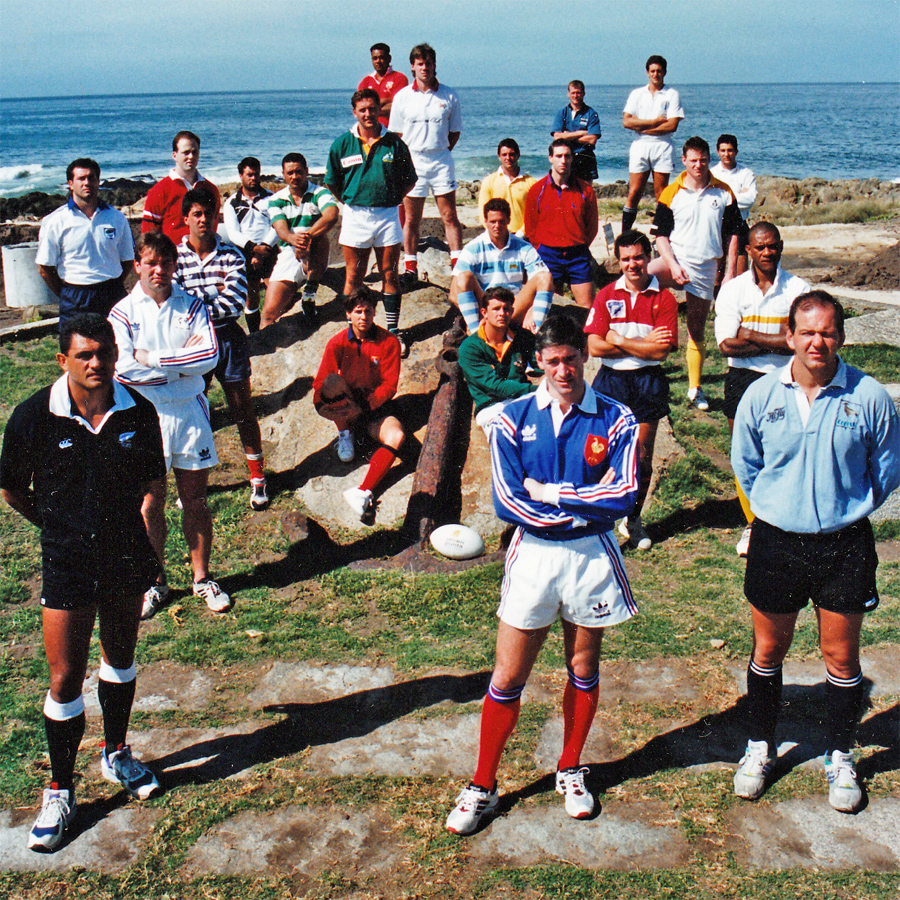 All team captains
prior to the tournament
All team captains
prior to the tournament
F�r�o�n�t� �r�o�w�: Eric Rush (NZ), Didier
Faugeron (France), Mario Lamé (Uruguay).
S�e�c�o�n�d� �r�o�w�: Bernard Debreil (FIRA), Renzo Zautkik
(Chile), Dio O'Cuinneagan (South Africa), César Cat (Old
Boys/Uruguay), Sami Nasagavesi (Fiji)
T�h�i�r�d� �r�o�w�: Rodrigo Crexell (Rosario), Mark Catchpole
(Australia), Pedro Baraldi (Argentina), Francisco Puertas
(Spain), Craig Brown (Penguins)
F�o�u�r�t�h� �r�o�w�: José Britos (Paraguay), Martin O'Connor
(US), Malaki Tupeli (Western Samoa), Juli†n Guillermo
Urgatamendia (Rio de la Plata), Pedro Vecino (Montevideo)
F�i�f�t�h� �r�o�w�: Isileli Tupou Fatani (Tonga), Dave
Priestas (Atlantis), José Buscaglia (Mar del Plata)
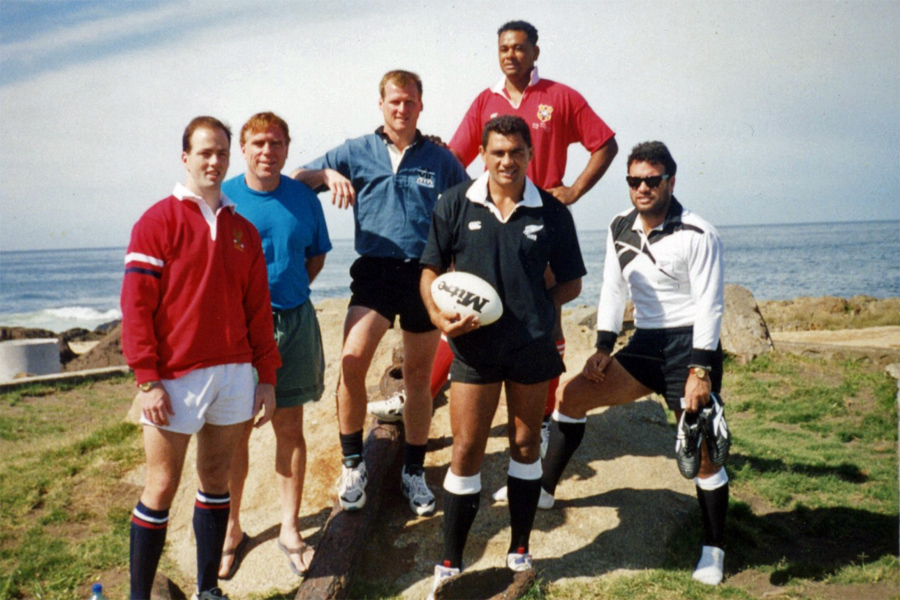 The Billy Gardner Picture: Billy and several
team captains
The Billy Gardner Picture: Billy and several
team captains
Marty O'Connor, US; Billy G; Dave Priestas,
Atlantis; Eric Rush, NZ; Isileli Tupou Fatani, Tonga; unknown
T�o�u�r�n�a�m�e�n�t�. The tournament took place on
January 7-�8, one day after "Reyes," a national holiday: the 12th
day of Christmas, when in commemoration of the Magi, the children
receive their gifts.
The tournament itself follows the now ubiquitous Hong Kong format:
24 teams arranged in eight groups of three. On the first
day, the eight groups are ranked one to three based on play within
the groups. The top teams go into the gold division, the
second place teams into the silver, and the third place teams into
the bronze.
For the first and only time, the tournament was moved to a small
stadium while the main stadium is being rebuilt into "the stadium
of the year 2000": although its 7,000 capacity was too small, it
did have its positive aspects. The place was packed to the
rafters on Sunday night, creating a great atmosphere.
The eight groups were seeded as follows:
��
A
�1 Fiji Cavaliers
��2 Uruguay
�����3 Mar del Plata (Argentinean province)
B
��1 South Africa
��2 FIRA *
�����3 Old Boys Club
* Selection from France, Spain, Portugal, Italy, Holland, Morocco,
Tunisia
C
��1 Argentina
��2 USA
�3 Montevideo
D
��1 France
����2 Spain
��3 Atlantis (US-�based invitational)
E
1Australian Barbarians
2 Chile
3 Buenos Aires
F
1 Tonga
��2 Penguins (England-�based invitational)
��3 Rosario (Argentinean province)
G
1 W. Samoa
��2 Invitation VII *
3 Paraguay
* players from New Zealand, Australia, Argentina, and Uruguay
invited by host club.
H
1 New Zealand
��2 Canada
3 Rio de la Plata (Argentina/Uruguay regional)
��S�a�t�u�r�d�a�y�
The seedings proved pretty accurate: only in group A, where Mar
del Plata finished ahead of Uruguay, and group F, where the
seedings were totally reversed, did the first day deviate from
form.
G�r�o�u�p� �A�.� One of the most incredible
games of the day was Uruguay vs. Fiji. With the final bell
already sounded, Fiji had the ball under pressure in their own
in�goal, trailing Uruguay (!) 24�-21. Being Fiji, they moved
it 100 meters to score the winning try. It was nevertheless
considered a great day in Uruguayan rugby history (had the game
ended 30 seconds earlier, it might have been remembered forever as
t�h�e� great day).
G�r�o�u�p� �B�.� South Africa had its hands full with
a FIRA side that played with the flair usually accompanied by the
word "French".
G�r�o�u�p�s� �C�,� �D� �a�n�d� �E�.� Argentina,
France, and Australia easily won both of their games.
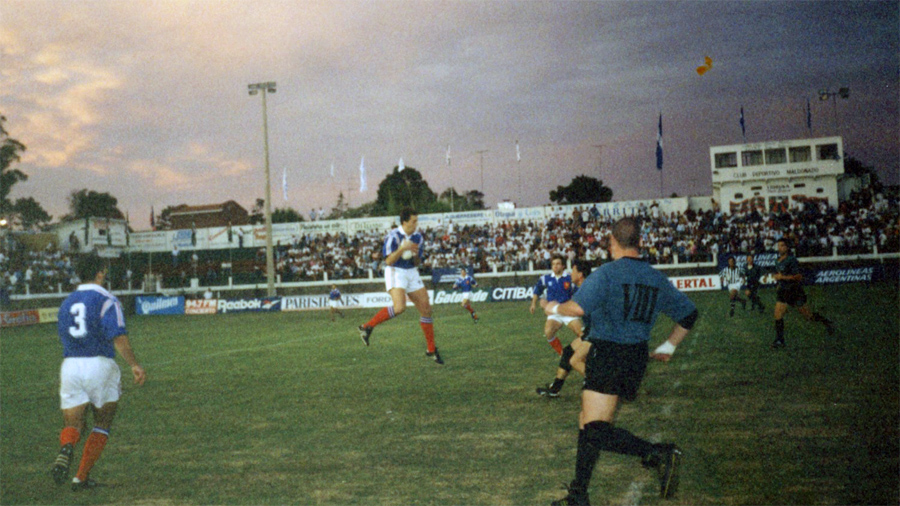
France receives Atlantis KO
G�r�o�u�p� �F�.� Next to the Fiji�-Uruguay match, the
Tonga�-Rosario match had to be the most exciting of the day, with
the score see�sawing back and forth until Rosario finally put the
game away with the last try, 24�-19.
G�r�o�u�p�s� �G� �a�n�d� �H�.� Western Samoa shocked
the "loaded" Invitational VII (Junior Paramore, Richard Turner,
Lindsay Raki, Lisandro Arbizu were among them), 41-�7 and cruised
by Paraguay, while New Zealand shut out both Canada and Rio de la
Plata.
P�a�r�a�d�e� �o�f� �T�e�a�m�s�.� Just as at Hong
Kong, all teams paraded around the ground. The ceremony took
place during the second series of round robin matches, immediately
following the Atlantis/France match, and featured parachutists as
well as many voluptuous and scantily�-clad Brazilian rumba dancers
entertaining the crowd and players.
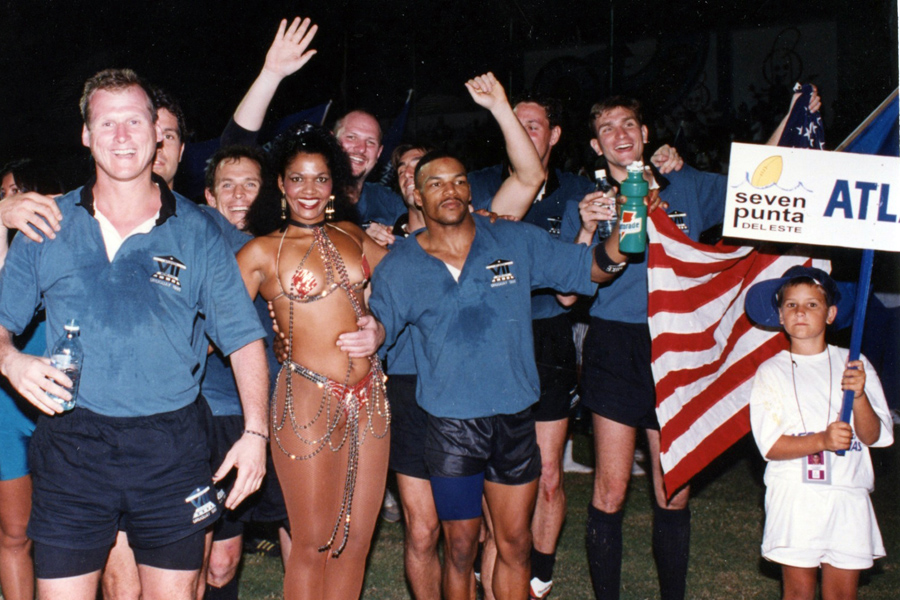 Atlantis players, our young sign holder, and
our guest Brazilian rumba dancer
Atlantis players, our young sign holder, and
our guest Brazilian rumba dancer
S�u�n�d�a�y�
As the games increased in intensity, the crowd increased in
enthusiasm, and by the finals the place was rockin'.
B�r�o�n�z�e�:� �T�o�n�g�a�.� In the Bronze
quarterfinals, Uruguay knocked off the Old Boys, Atlantis defeated
Montevideo (AKA Uruguay "B"), and Tonga and Rio de la Plata won
their games in the lower half of the bracket.
A�t�l�a�n�t�i�s� �1�4� �U�r�u�g�u�a�y� �7�.� In the Bronze
semifinal, Atlantis surprised Uruguay and thousands of cheering
spectators, with two Thaddeus Hill tries, to win 14-�7.
Hill's first try was on a switch off Charlie Wilkinson for about a
30�-meter try, and, after Uruguay had tied the game, a long break
finished off by Hill got Atlantis ahead for good. With the
ball in his hands as the final bell rang, Hill had only to kick to
touch, but instead ran into trouble and was penalized.
Atlantis shut down the ensuing Uruguay attack to win the game.
T�o�n�g�a� �3�1� �A�t�l�a�n�t�i�s� �1�0�.� In the
Bronze final (Tonga had crushed Rio de la Plata), Atlantis went
ahead of Tonga 5�-0 after a great individual effort by Brian
Gallagher. Atlantis' inability to win good scrum ball,
however, gave Tonga many possessions it shouldn't have had, and
like all Tongan sides do, they scored on several of them.
Atlantis only had one other score �� a try from a penalty when
John Flamish slashed through a gap �� in a 31-�10 loss.
S�i�l�v�e�r�:� �F�I�R�A�.� FIRA, coached by long�time
Cěte Basque and Spain coach Gerard Murillo, barely squeaked by Mar
del Plata 17-�14, before redisplaying its French�like sizzle with
a 24�-0 dusting of Spain. In the Silver final, the FIRA
players rolled on the ground hugging each other with joy after a
hard�fought 24-�19 victory over the Invitational VII.
Incidentally, Gabriel "Bull" Alonso, the person most responsible
for getting Atlantis invited to Punta del Este (see below) played,
in my opinion, the best sevens of the entire Invitational
VII. I thought he might have been a valuable addition to the
Uruguay squad.
Chile, victim to the Invitation VII, nevertheless showed a good
command of sevens in defeating the Penguins in the Plate
quarterfinals.
G�o�l�d�:� �A�r�g�e�n�t�i�n�a�.� The gold division began
with a 49�-0 dusting of South Africa by Fiji. (The results
of this game sowed some seeds of doubt in the American players'
minds about Charlie Wilkinson's knowledge of the game: he had set
the line and was giving Fiji 9 points.)
The next game turned out to be far more crucial than anyone knew
at the time: with France leading 10�-7 and no time left, Argentina
scored the winning try on a pass everyone but the referee realized
was forward.
Australia put an end to Rosario's Cinderella quest, 33�-7, with a
hat trick by their 18�-year old wing Ben Tune, and Western Samoa,
led by Brian Lima, defeated New Zealand 12-�5.
Fiji stormed ahead to a 12�-0 lead over Argentina, and this game
looked to be a repeat of their match vs. South Africa. But
they got cocky, got tackled on their goal line, coughed up the
ball for a Puma try and Argentina was in the game. The Pumas
again scored on the ensuing kickoff with one of the great tries of
the tournament, and took command of the game. Argentina
ended up scoring 5 consecutive tries in a 29�-17 win.
With Fiji and New Zealand, last year's finalists, gone, Western
Samoa became the team to beat. Australia, led by Tune -� who has never played a game of senior rugby
�- did just that. With an incredible
combination of moves and speed, Tune put Australia ahead early in
the match and also finished the scoring in a 26-�10 win.
C�h�a�m�p�i�o�n�s�h�i�p�
�F�i�n�a�l�
Argentina 36
|
|
Australia 19
|
Baraldi (2T)
|
1
|
Flanagan (T)
|
Martín (T)
|
2
|
Connors
|
Viel
|
3
|
Kelaher (2C) **
|
|
|
|
Pichot (T)
|
4
|
Catchpole (T)
|
del Castillo (T)
|
5
|
McMullen
|
Bouzo (3C, PK)
|
6
|
Fielke *
|
Albanese (C)
|
7
|
Tune (T)
|
|
|
* replaced by Langford
|
|
|
** replaced by Lodge
|
Australia got on the board first with a Michael
Flanagan try, but Argentina responded quickly with a try by
Fernando del Castillo. The teams traded tries again (Ben
Tune and Rolando Martín). With only
about a minute left in the half, Australian captain and scrumhalf
Mark Catchpole scooted around the scrum for about a 40�-meter
try. Argentina raced up to the half way line and grubbed a
kickoff away from the forwards, which eventually resulted in a try
for Puma captain Pedro Baraldi. Argentina went into the half
leading 21�-19 and it turned out to be all they needed.
Baraldi added a second half try on an interception, del Castillo
added a PK, and tournament MVP Agustín
Pichot closed out the scoring with a try, and Argentina won the
match 36�-19.
Luis Alberto Lacalle Herrera, President of the Republic of
Uruguay, added even more class to the event by presenting the
award to the visitors.
A�m�e�r�i�c�a�n� �t�e�a�m�s�.� Two American teams
participated in the tournament: an official US selection coached
by former Eagle Jim Wilkinson, in his first stint at high�level
coaching, and Atlantis, an invitational side that I put together
and coached.
T�h�e� �U�S� �t�e�a�m� �c�o�m�p�r�i�s�e�d�:�
Chris Andres��, NOVA
Jon Campbell, Atlanta Renegades
Chris Carney, Montauk (NY)
Chris Motes, Old Blues (CA)
Marty O'Connor, South Jersey
Joe Santos, OMBAC
Ed Schram, OMBAC
Mike Siano, Life College
Rich Schurfeld was also selected, but had to drop out at the last
instant when his business became victim to the California floods.
This left Jimmy with eight players, and he reluctantly dusted off
his boots, just in case.
Note of 2013: Counting Jimmy, 7 of the 9 US players have
represented Atlantis, either before or after this tournament.
U�S� �2�1� �M�o�n�t�e�v�i�d�e�o� �7�.� Montevideo
scored first after it won its own kickoff and supported
well. The US, who started shakily, finally got on the board
with a length of the field try started by Marty O'Connor and
finished by Chris Andres. The halftime score was 7-�7, but the US was in the driver's seat and
never looked back.
The US dominated the second half and easily won the game.
Captain O'Connor and Jon Campbell scored tries. Chris Motes
converted all 3 tries.
U�S� �7� �A�r�g�e�n�t�i�n�a� �3�3�.� This was
Argentina's tournament, and they played a brilliant game against
the US, who scored its only try when Chris Carney committed
several defenders and produced the ball to Chris Motes, who got it
to Campbell and then to Andres for a good try. With injuries
to Mike Siano and Ed Schram, Jim Wilkinson got in his first bit of
national duty in several years, finishing the last 3 minutes of
the match as a player.
U�S� �1�2� �S�p�a�i�n� �1�4�.� The US took an
early 5�0 lead on a try by Chris Motes. Spain, however, went
ahead 7�-5 after applying heavy pressure on the US following their
kickoff. Early in 2nd half, with the score still 7�-5, a
Campbell drop kick attempt missed its mark. With the US
pressuring Spain in their own goal, a Spaniard got through a gap,
was tackled by Ed Schram, but managed to pass to support, who took
it the final 80 yards. It was to be the winning try in a
game totally dominated by the US. The US then spent what
seemed like an eternity camped out at the Spanish goal line, and
was awarded penalty after penalty. Some poor US decisions
combined with a furious Spanish defense, however, delayed the
inevitable US try until very late in the match. With the
score 14-�12, US had a brief chance to come back but Spain held
out.
Jim Wilkinson was delighted with his first opportunity to coach at
this level, and enjoyed working with the team. Nevertheless,
the triple duties of coach, manager and player put some pressure
on him. "I didn't feel," he commented, "that I was
able to take the pressure off the players as much as I would have
liked to."
A�t�l�a�n�t�i�s�. During the Benidorm Sevens last
June, Atlantis shared a long bus ride from Madrid to Benidorm with
the British School Old Boys, Uruguay's representative at
Benidorm. As a result of this, a week�long friendship
resulted which ultimately culminated in an invitation to Atlantis
to participate. The Atlantis team comprised (name preceded
by Atlantis number):
158 Al Dekin, Washington
217 Brian Dettling, Bethlehem
207 Drew Fautley, New York
78 John
Flamish, Philadelphia-Whitemarsh
143 Brian Gallagher, Maryland Exiles
229 Thaddeus Hill,
Fort Worth
230
Dan Kennedy, Old Blue (NY)
8 Dave
Priestas, Bethlehem
128
Charlie Wilkinson (C), NOVA
Atlantis was fortunate to have two management personnel, Bill
Gardner and Terry Ziegenfuss, on board.
"�T�u�r�i�s�t�a�"�.� Some sort of virus hit the team,
as virtually all 12 tour party members became ill, some more than
others. Al Dekin and Terry Ziegenfuss were so ill that they
never left the hotel on Saturday, and Al did not participate in
either round robin game.
A�t�l�a�n�t�i�s� �1�4� �S�p�a�i�n� �2�4�.�
Nevertheless, with a 14�-7 halftime lead over Spain, and Atlantis
in control, it seemed virtually certain that a Plate Quarterfinal
matchup between Atlantis and the US was in store. Spain,
nevertheless, had other things in mind, and came back with two
tries, one of them after an ill�advised Atlantis line�out throw
over the top. Trailing 19�14 with no time left, Atlantis
stole the ball from Spain, created an overlap and for a few brief
seconds seemed destined to win. Spain, however, intercepted
a pass and finished the scoring itself.
A�t�l�a�n�t�i�s� �7� � �F�r�a�n�c�e� �4�6�.�
Atlantis' defeat at the hands of France was complete and total and
embarrassing, and the players were not in the mood to go directly
from that game into the tournament parade around the
grounds. For some, watching the Brazilian rumba dancers
seemed to momentarily ease the agony.
A�t�l�a�n�t�i�s� �1�7� �M�o�n�t�e�v�i�d�e�o� �7�.�
Atlantis defeated Montevideo without much trouble, on 2 tries by
Brian Gallagher and one by Al Dekin.
Thaddeus Hill was the Atlantis defensive star, and was cited in
the official video of the event as "one of the best tacklers of
the tournament."
C�a�m�r�a�d�e�r�i�e�.� Both American teams practiced
together, sat together, and cheered for each other. It was
probably best for all concerned that they never got to play each
other.
��
U�S� �s�c�o�r�i�n�g�
Name
|
T
|
C
|
Pts
|
Motes
|
1
|
4
|
13
|
Andres
|
2
|
0
|
10
|
Campbell
|
1
|
1
|
7
|
O'Connor
|
1
|
0
|
5
|
Schram
|
1
|
0
|
5
|
Total
|
6
|
5
|
40
|
A�t�l�a�n�t�i�s� �s�c�o�r�i�n�g�
Player
|
T
|
C
|
Pts
|
Gallagher
|
4
|
0
|
20
|
Dekin
|
1
|
3
|
11
|
Kennedy
|
2
|
0
|
10
|
Hill
|
2
|
0
|
10
|
Flamish
|
1
|
0
|
5
|
Dettling
|
0
|
2
|
4
|
Priestas
|
0
|
1
|
2
|
Total
|
10
|
6
|
62
|
Party. The tournament party took place in an incredible
natural grotto in Punta Ballena, just on the outskirts of Punta
del Este. To get to the grotto, one has to cross a walkway
that runs over the water as it washes up over the beach and
against the rocks. It's simply beyond me to describe it
other than to say it was amazing. Everyone seemed to be
enjoying themselves as more and more players arrived, but as it
was approaching 4 AM, this author, one of the more heavily
stricken Atlanteans, went back to the hotel to sleep.
C�h�a�r�l�i�e� �a�n�d� �C�h�a�r�v�e�t�.� One of the
unique opportunities of events like these at international
tournaments is the social interaction between players.
Witness this conversation between Atlantis' Charlie Wilkinson (40+
sevens games for the US) and Denis Charvet of France.
��
Wilkinson:�� ��"You're pretty good. Where have you been?;
I've never seen you around."
Charvet:��,����� ��"I've been capped 30 times for France."
Wilkinson:�� ��"Yeah, well [but let's talk about the important
things], you've never been to Hong Kong."
��
What Charlie meant, of course, was that with all the mediocre
sevens teams that France has sent to international tournaments in
the past, how could they not have sent someone as talented as
Charvet?
Charvet, however, will attend Hong Kong this year with virtually
the same squad that participated in Uruguay. It should be
far more competitive than any sevens team the French have fielded
in the past.
S�t�a�t�i�s�t�i�c�s�.� People that know me realize my
fascination for statistics. The Old Boys have someone on
their club with a similar fascination, as shown by the following
list that appeared in their program:
216 players / 24 coaches / 24 managers / 11 referees / 8 members
of the Control Desk / 62 people in charge of delegations / 353
hotel reservations / 24 minibuses / 45 matches / 630 minutes of
game / 10.5 hours of rugby / 556 meals per day / 20,000 leaflets /
5,000 posters / 15,000 stickers / 20 sales promoters / 3,000
guests to the function / 32 reporters / 800 T�shirts / 200 jerseys
/ 1,000 radio commercials / 320 accreditations / 4 parachutists /
20 musicians / 15 rumba dancers / 22 ball boys / 10 secretaries /
7 TV cameras / 5 painters / 6000 square metres of grass / 30
security agents / 240 air tickets from 5 continents.
The other type of statistics of interest are the scoring
totals. This year's tournament featured 277 tries: 158 on
Saturday and 119 on Sunday. This averages out to more than 6
tries a game, and is very close to the 275 tries scored in Hong
Kong this year. Not so long ago, sevens tournaments were
averaging only about 5 tries per game. It ain't getting any
easier for the defense!
"�A�l�i�v�e�"�.� The story of the Uruguayan rugby
team that survived 70 days in the Andes following a plane crash,
as described in both the book and movie "A�l�i�v�e�," has always
struck me as an incredible tribute to the human capacity to
endure, and when I found out that Nando Parrado, one of the heroes
of the story, lived less than a block from our hotel, I tried in
vain to find some reason to meet him. Realizing I could do
no more than gaze upon him like some starry�eyed fan, I did not
pursue the idea.
M�o�r�e� �s�e�v�e�n�s�:� �A�r�g�e�n�t�i�n�a�'�s� �M�a�r�
�d�e�l� �P�l�a�t�a� �S�e�v�e�n�s�. Latching on the success
of the Punta del Este Sevens, the top Argentinean beach resort,
Mar del Plata, held its own sevens tournament the following
week. No US teams took part, and I can report only that New
Zealand won the tournament.
Atlantis had its own trips to Argentina in our four hour layover
in Buenos Aires. The majority of the players got lost in a
misguided sojourn downtown, but four of us �� Fautley, Dettling,
Dekin and I �� ended up at "La Lechonera," a wonderful huge
outdoor restaurant in the suburbs. Specializing in suckling
pig, it suited Drew perfectly. The owner came to visit and
took care of us. A good time was had by all, and we tipped
our taxi driver Danny DeVito handsomely for bringing us there and
staying with us to enjoy the meal.
PICTURES
FROM LA LECHONERA
P�u�n�t�a� �d�e�l� �E�s�t�e� �S�e�v�e�n�s�:� �t�h�e�
�f�u�t�u�r�e�.� Not to be outdone by Hong Kong, Punta
del Este is rebuilding its own stadium, to be completed in June of
this year. The N�u�e�v�o� �C�a�m�p�o� �M�a�l�d�o�n�a�d�o� ��
"the stadium of the year 2000," as it's being billed �� will seat
25,000, including a roofed box with a seating capacity of 400.
There will be a VIP lounge for 500 people, 28 broadcast cabins, a
4,400 square foot press room and a 2,000 square foot press
conference hall, plus ample changing areas and enough illumination
to have a luminosity of 700 luxes at every point on the pitch (and
we all know how important that is!)
Most likely the trend will be to continue to increase the presence
of national teams, and the days of invitational sides may soon be
numbered. From a personal point of view, I hope that time
can be delayed for a few years.
T�h�a�n�k�s� from all participants are due to the tireless
organizers of the tournament, especially to Pedro Bordaberry,
tournament director, to Norman Fox, club president, and to José
Obes and Mart°n Stefani and other members of the Committee.
Special thanks from Atlantis to Gabriel "Bull" Alonso and the
entire Old Boys squad in Benidorm for getting us invited, to Jorge
Freccero for taking care of us at the airport, and to Drs. Carlos
Garbino and Gonzalo Rodriguez Quagliata for taking care of us
during two entire days of physical misery.
�A�p�p�e�n�d�i�x� �2�:� �G�a�m�e-b�y-���G�a�m�e�
�S�c�o�r�i�n�g� ����� �A�t�t�a�c�h�e�d� (check see if I
have this)
��
